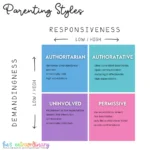As a parent, it’s essential to know how your parenting style can influence your child’s behavior. After all, you want to raise your child in a way that nurtures and encourages them to grow into a well-adjusted adult. Luckily, there are plenty of studies that have been done on parenting styles and how they affect child behavior. In this article, I will be discussing the different types of parenting styles and how they could potentially affect your child’s behavior.
“Understanding the Impact of Different Parenting Styles on Children’s Behavior”

It’s important to understand the different parenting styles and how they can affect children’s behavior. Different parenting styles can have a huge impact on how children perceive the world, their values, and communication styles. Authoritarian parenting, for example, is characterized by strict rules and expectations that children must adhere to without any room for negotiation. On the other hand, Permissive parenting style is more laid-back and allows children to make their own decisions. Each style has its pros and cons and can affect children in different ways. It’s important to find a balance between the two and to create an environment of mutual respect and understanding. Ultimately, understanding how parenting styles can influence a child’s behavior can help parents create a positive and supportive home environment.
“The Role of Authoritarian and Permissive Parenting Styles in Shaping Child Behavior”

When it comes to parenting styles, authoritarian and permissive styles have a big influence on shaping a child’s behavior. An authoritarian parent will be strict and have a lot of rules and expectations, while a permissive parent will be more lenient and give the child more freedom. This can have an effect on the child’s behavior, from being more obedient to being more rebellious. The authoritarian parenting style will usually lead to the child being more obedient but can also lead to a lack of creativity and independence. On the other hand, the permissive parenting style will usually lead to more creativity and independence, but can also lead to the child being more rebellious and having less respect for rules. Ultimately, it’s up to the parent to decide the right balance between authoritarian and permissive parenting styles to find the best outcome for their child.
“How to Balance Discipline and Support for Optimal Child Behavior”

Balancing discipline and support for optimal child behavior can seem daunting, but it doesn’t have to be. Finding the right balance of disciplinary actions and positive reinforcement can help foster a healthier relationship between parents and their children. As a parent, it’s important to remember that discipline should be centered around teaching and learning, not punishment. This means taking the time to explain why their behavior is wrong and helping them understand how to correct it. Additionally, it’s important to provide your child with support and encouragement to help them feel secure and loved. This balance of discipline and support will help ensure that your child grows up to be successful and well-adjusted.
“The Benefits of Positive Parenting on Child Development”

Positive parenting is immensely beneficial for a child’s development. It encourages children to form healthy relationships, explore their skills and talents, and develop empathy and self-esteem. Positive parenting also helps children to become more resilient and better able to cope with difficult situations. It can also help children to develop a sense of responsibility and independence, enabling them to make better decisions and become successful in their own lives. By setting healthy boundaries and positive expectations, parents can ensure that their children are well-equipped to handle the challenges of life.
“Recognizing Signs of Unhealthy Parenting Practices and Their Effects on Children”

As a parent, it can be difficult to recognize when our parenting practices are having a negative effect on our children. It is important to be aware of the signs that our parenting is unhealthy and the effects it can have on our children’s behavior. Unhealthy parenting practices such as authoritarianism, over-involvement, lack of boundaries, and inconsistent discipline can lead to children feeling neglected, stressed, anxious, and even angry. These feelings can manifest in a number of different behaviors such as aggression, excessive talking, and difficulty following instructions. It is important to understand when our parenting practices are having an unhealthy effect so that we can make the necessary changes to ensure our children are receiving the best care possible.



